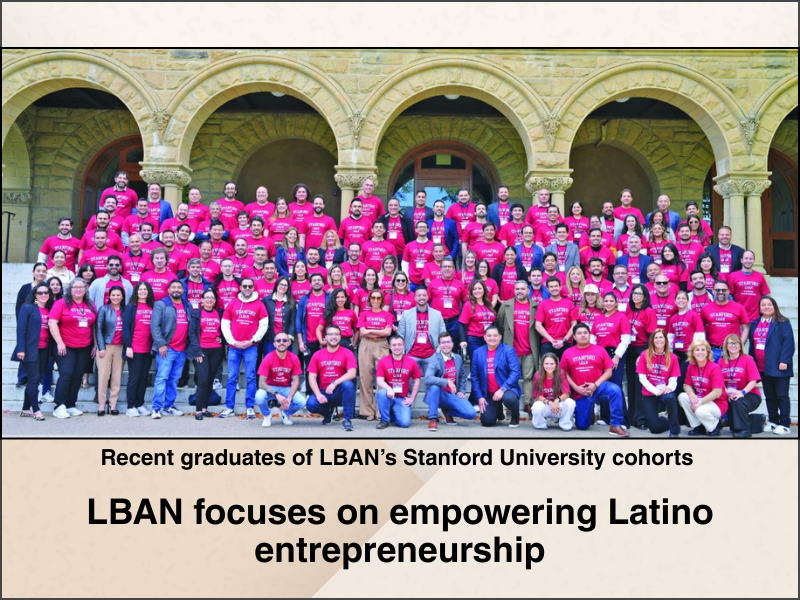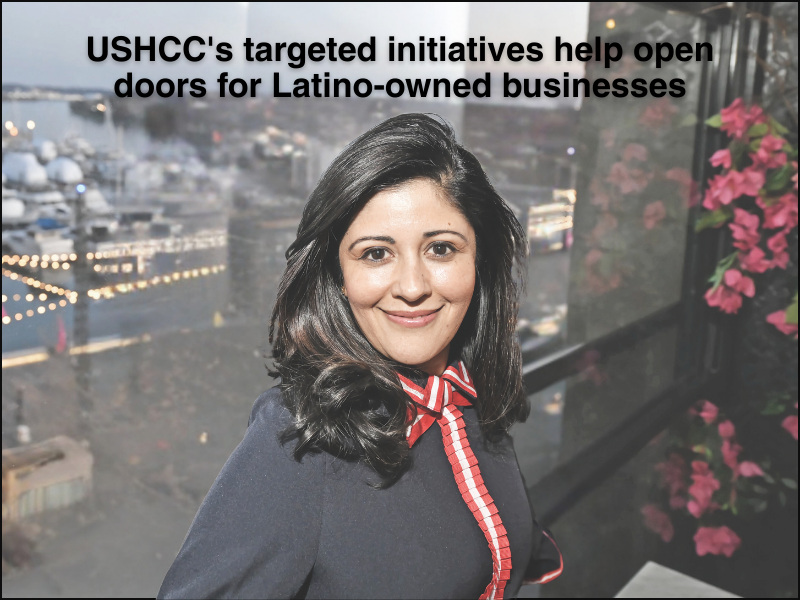LBAN's three-pronged strategy: research, education and ecosystem-building
By Brenda
Matamoros
3 Key Takeaways
- The Latino Business Action Network’s mission is to empower Hispanic-owned entrepreneurship in the U.S.
- Latinos are starting businesses at nearly double the national rate, contributing significantly to job creation and innovation.
- Latino-owned businesses generate $800 billion annually to the U.S. economy.
For the
Latino Business Action Network (LBAN), an independent nonprofit based in
Silicon Valley, its mission is to grow the U.S. economy by empowering Latino
entrepreneurship. At the center of this effort is the LBAN team of dedicated
professionals led by CEO Arturo Cázares — a group of individuals whose
commitment and expertise are building a stronger, more inclusive
entrepreneurial ecosystem for Latinos across the country.
Latino-owned
businesses now exceed five million, generating more than $800 billion annually,
according to the LBAN-SLEI State of Latino Entrepreneurship Report. The report
shows that without the rapid creation of new companies by Latino entrepreneurs,
the total number of U.S. businesses would have declined. According to the same
report, in the last five years, the number of Latino-owned businesses grew
by 44% compared to a slight decline in other groups, contributing significantly
to job creation and innovation.
Despite
this growth, barriers remain. Latino founders receive less than 2% of venture
capital funding, even as they account for nearly one-fifth of tech companies,
according to the report.. Limited access to corporate and government
procurement contracts also restricts growth. LBAN works to address these
ecosystem challenges so that Latino-owned businesses — and all entrepreneurs —
can thrive.
“We don’t
start with what’s ‘missing’ in Latino entrepreneurs. We start with their power
— and then address the ecosystem deficiencies that block opportunity,” Cázares
said.
Scaling
power
He said
LBAN’s strategy rests on three pillars: research, education and
ecosystem-building.
Research.
The annual State of Latino Entrepreneurship Report, produced with Stanford
University, documents Latino economic contributions and highlights barriers to
growth. It is cited by institutions including the Federal Reserve System and
the Congressional Hispanic Caucus. Additionally, every March LBAN, along with
Stanford Graduate School of Business, cohosts the State of Latino
Entrepreneurship Summit, which is open to the public.
Education.
LBAN delivers two Stanford-based programs — the Business Scaling Program and
the StartUp Accelerator. These nine-week experiences combine instruction from
Stanford faculty, mentorship and peer learning. More than 1,400 entrepreneurs
have completed the programs, gaining tools for growth and a supportive network.
Ecosystem.
LBAN sustains an ongoing network of alumni, mentors, banks, venture capital
firms and corporate partners. The guiding motto is: “Do business with each
other. Get business for each other.”
“We are
scaling the power of community to a national level — connecting entrepreneurs
to each other, to opportunity and to the future they deserve,” Cázares said.
According
to the U.S. Latino GDP Report by the Latino Donor Collaborative, U.S. Latinos represent a $4.1 trillion gross
domestic product, comparable to the fifth-largest economy in the world.
According to Cázares, Latino-owned firms are growing revenue at a faster rate
than the average. If ecosystem challenges are addressed, these companies will
reach the average size of U.S. companies, and the country would gain an
additional $1.1 trillion in output.
Building
networks
LBAN’s work
reframes the narrative of Latino entrepreneurship as one of power and
opportunity. The organization emphasizes that expanding access is not zero-sum;
growth for Latinos expands the economy for everyone.
During the
COVID-19 pandemic, LBAN’s alumni ecosystem provided vital support.
Entrepreneurs shared solutions, contacts and strategies to secure PPP loans and
navigate uncertainty.
The annual
State of Latino Entrepreneurship Summit at Stanford brings together over 1,000
participants, including entrepreneurs, capital providers and policymakers.
Regional events in Miami, Chicago, Los Angeles and Houston extend this
community-building nationwide.
“We make
talent visible and equip entrepreneurs and capital allocators to overcome the
gatekeeping that holds back opportunity and economic growth,” Cázares said.
Cázares’
journey
Before
becoming LBAN’s CEO, Cázares’ own life shaped his commitment to fairness and
opportunity. He was born in Mexico and immigrated as a child with his family to
California’s Central Valley. Beginning at age 10, he and his siblings worked
alongside their father in the fields. His parents, who had only completed two
years of grade school, had no choice but to rely on their labor and that of
their children to survive.
Cázares
recalls his father telling him, “In this country, Mexicans need to work twice
as hard. But it’s OK. We can work three times as hard.”
It is not
right for children to have to shoulder that kind of burden, but when survival
demanded it, like many Latinos, Cázares’ family did what was necessary. He and
his brothers were fortunate — they eventually found a path out of the fields.
Yet, he never forgot that many other children worked just as hard and were
equally deserving, but were not as lucky.
That
awareness became a powerful motivator as Cázares gained an education,
citizenship and opportunities. It has shaped his lifelong commitment to
improving conditions so that success is not left to luck or superhuman effort
but built on fairness and access for all.
Cázares
became the first in his family to attend Stanford University, where, as an
alumnus, he founded the Stanford Latino Alumni Association to create lasting
connections for Latino graduates. He had senior leadership positions in several
technology startups, as well as led large multibillion-dollar business units
with thousands of employees at large corporations. Since becoming LBAN’s CEO in
2021, he has led a team that has expanded programs, research and partnerships
to support entrepreneurs nationwide. Today, LBAN is recognized as a thought
leader on Latino entrepreneurship, working to build an ecosystem where
opportunities are shared, not hoarded.
“Talent
exists everywhere, but opportunity does not. My hope is to open more doors so
more people can shape a better future — for themselves, their community and our
country,” Cázares said.
Measuring
outcomes
LBAN
evaluates its progress by tracking citations of its research, the success of
program graduates and the growth of its ecosystem. Its research is used by
policymakers and financial institutions, while alumni secure contracts, raise
capital and create jobs. Each success story demonstrates the impact of
combining talent with opportunity.
LBAN’s role
is to act as both catalyst and convener, Cázares said. Through programs,
research, education, a growing network and community-building, it works to
create a healthier entrepreneurial ecosystem and a stronger U.S. economy.
“What’s
more American than creating a fair society where everyone has a chance to
succeed? By building a healthier ecosystem, we unlock growth for everyone,”
Cázares said.
LBAN is
advancing a vision of entrepreneurship that is inclusive, data-driven and
collaborative. Through programs, research and a growing network, it is helping
to shape an economy where access is broadened and opportunities are shared.
To learn
more about LBAN, visit lban.us.
To learn more about the State of Latino Entrepreneurship Report, visit lban.us/research.





